- Home
- Robin McKinley
Water Page 11
Water Read online
Page 11
Where was Jarro? Safe in his bed on the northern shore, but . . . was he still dreaming the wave, following the serpent as it was swept through the tumult of waters? Why no warning from him of the last attack? Why nothing now? It was only his body in the bed, while his mind ventured among the spirit waters—dangerous as a tide-rip, Mel had said.
Speak to me, my son!
Nothing. Nothing from Jarro. But again through the dream of his exhaustion, the flicker of the serpent’s hunt-lust, smelling out the traces his body had left in the water, sensing the feeble movements of his swimming—all this though his lifetime of dealings with these currents told him that he was no longer in the lagoon, but over the flats to the east of it, where the serpent could not come. He shut his mind to it, managed to switch the float beneath his other arm and forced himself on south, resting longer each time between the feeble strokes.
He was still swimming when his hand hit solid matter, vertical, softish, a wall of wet earth. Letting his legs sink, he found he could stand chest deep. The footing was too firm for a mudbank. Turf, a flooded meadow. An old man-made bank to the south of it, built to protect the fields beyond from such high tides. Half swimming, half hobbling, he felt his way along it until he came to a stone boundary wall and was able to climb onto that and thence to the top of the bank. He started to crawl along it. Even if he had had his crutch he could not have walked.
His cousin’s son, not a wave-rider but a farmer, came out to look for him with two of the farm slaves carrying torches. Mel had sent the man a dream telling him where Iril lay, and had then woken him and spoken in a clear voice in the dark of his hut, telling him to go and find him. They carried him home unconscious, and his sons’ wives rubbed him with salves for the rest of the night in front of a great fire, massaging the life-warmth back into his body.
While he still slept, men came to say that the serpent was raging in the lagoon, trapped by the falling tide. The wind had died clean away and the next tide barely lapped the bar. Two of Iril’s crew had come exhausted to the village, one was found unconscious on the shore, and one dead. The other two were not seen again.
When Iril woke, they carried him down to the lagoon to watch the serpent die. This it did with slow, agonised writhings, having threshed the lagoon to stinking mud which it could not breathe. Dead, it immediately rotted, the skin bursting apart and black, stinking stuff oozing out, smoking as it reached the air. Those that breathed the smoke dropped to their knees and vomited, while the gulls that came for the carcass meat fell out of the air and died.
Iril’s eldest son brought a raft over on the next day’s wave, to check that the passage was now clear. With him came Jarro, who had slept for a day and a night after the storm, with Mel watching by his bed all that time. He was still almost too weak to stand, and needed to be helped up to the village. But next morning he insisted on going to see where the serpent had died. Iril went with him. They stood and looked in silence at the poisoned lagoon. Bubbles still rose to the oily surface, their vile reek wafting on the wind.
“I was there,” said Jarro quietly. “I was trapped with the serpent. After the first decoy, it happened. The serpent lost you. It did not follow. I sought its mind. I spoke to it. ‘There!’ I told it.”
“I heard your thought, my son.”
Jarro nodded.
“The serpent followed you. It came fast. I tried to call to you, but I could not. I was caught up into the mind of the serpent. I thought with its thought. I felt its hatred. I felt its hunger. I joined in its hunting. I hunted you, my father.”
“No shame,” said Iril.
“It was trapped in the lagoon,” said Jarro, still in the same quiet, half-dreaming voice. “It raged, and I raged with it. It suffered, and I knew its pain. It began to die, and I died too. Then Mel came. He came by the spirit paths and found me and set me loose.”
For a long while Iril said nothing. There was horror in his heart to think how near he had come to killing his own son. And even though he lived, who could tell what the terrors of the adventure might have done to the boy? No, not a boy. Not any longer. He could tell, by the tone of his son’s voice, by the way he had told his story, that in a night and a day Jarro had put his boyhood behind him, just as Iril himself had, in the squall in which his own father had died. And like Iril, from now on and for all his life Jarro would carry the scar of the event.
“You did well, my son,” he said at last. “No man could have done better. Together we did this, you and I. We killed the great serpent.”
“No, Father,” said Jarro, “I did little to help.”
“Not so, my son,” said Iril. “You did what no other could have done, venturing along the spirit paths. The serpent lost me. It did not follow. I would have failed if you had not reached into its mind and spoken. Who before this has heard of such a deed? Mel himself could not have done it. He cannot dream the wave. That is our gift, ours alone, yours and mine. By the axe of Manaw, I say again, we killed the great serpent.”
Normal traffic resumed. The ten stones were rafted down from Silverspring and the rafts linked together into the structure Iril had planned. He crossed the water to see that all was well, and to make any necessary adjustments and adaptations, but he let Farn take command when the full moon came and the whole great raft was floated over. Iril came as a passenger, saying he was still too weak for the work, though to others he seemed as strong as he had been before. It was a simple crossing on a big, clean wave. Siron sent nothing to hinder it. Once across, the raft was taken apart and the separate stones floated along the shoreline and upriver.
That done, they held a praise feast for Iril. Mel himself came, not a shadow or sending, and spoke marvellous praise, and praise for Jarro too, telling what he had done among the spirit paths. It was praise such as would be told for many generations. He left next day for the high ritual that would inaugurate the stones in their new home, and all the men except Iril went with him.
Iril’s sons came to him, and stood side by side before him.
Farn said, “Come. There will be a place of honour for you, a place among the Major Chieftains.”
Iril said, “I am too old and weak for such a journey, and my leg is very painful.”
Arco said, “Perhaps Mel will heal it.”
Iril shook his head.
“A contract is a contract,” he said. “But I have done a thing no man ought to have done.”
He took from his arm the three gold bracelets that Mel had paid him and gave one to each son.
“Go with my blessing,” he said. “And take my place among the Chieftains.”
He watched them walk away, noticing with pleasure how his two elder sons, mature men with wives and children, now accepted Jarro as their equal.
The day after they left, the women gathered in a long line, Farn’s first wife leading, and danced solemnly though the village, three times, with many twists and windings. They sang in grieving voices, words Iril did not know, their secret language. Then they gathered in silence into a circle. One after another round the circle each took a pace forward, and knelt for a while, as if listening, then rose and went at once to her own hut.
That evening Farn’s first wife came to Iril’s hut with a salve.
“This is for your leg,” she said. “It will ease the pain.”
“Nothing can ease the pain. All has been tried.”
“This is new. Siron showed it to me. She said, ‘Say this to Iril. No curse of mine is on him.’”
“When did you see Siron?”
“This morning. Did you not see her? We danced and sang for her and she said farewell.”
“Farewell?”
“Yes. She has gone. Those times are over.”
WATER HORSE
When the Guardian of Western Mouth chose Tamia for her apprentice, no one was more surprised than Tamia herself.
The Guardian’s choice was surprising in more ways than one. Everyone in Tamia’s inland village paid the Guardians’ token as all t
he islanders did, and “please the Guardians” and “as the Guardians hold back the sea” were sayings as common there as anywhere. But Guardians’ apprentices came from the fishing villages, or at least from the villages that lay near the shore, outside the ragged ring of the Cloudyhead Mountains, with a view of the sea. Many inlanders never saw the sea at all; “Mountains are the right horizon for me” was a common inlander remark.
Every islander, inland and seaward, had heard that the Guardian of Western Mouth was growing old, and that she still had taken no apprentice. Although of course the Guardians always knew what they were doing (it was one of the things they learned in the process of becoming Guardians), still, it was very odd, how long Western Mouth had put off taking an apprentice. Some of the voices saying this rang and echoed on the phrase very odd, with a curious, intent, almost greedy intonation. But no one in Tamia’s village had been interested in contemplating who might finally be chosen, as it would not be one of them.
Tamia was her mother’s eldest child, and the only one by her first husband, who had died in a hunting accident. Her second husband, Tamia’s stepfather, tolerated Tamia’s presence in his household because she was quiet and useful. Tamia had never asked her mother what she thought about her husband’s attitude towards his stepdaughter. She had been afraid to ask since she had seen the look on her mother’s face when the midwife put her second husband’s first child in her arms. Tamia had been six. She had spent the year since her mother remarried trying to be helpful. She had known that her stepfather didn’t want her, but she had hoped he might change his mind. After Dorlan’s birth—followed by Coth, Sammy, Tinsh, Issy and Miz—she grew accustomed to the idea that he would not. At least, with so many little ones to look after, there was never any shortage of work for Tamia to do.
Tamia was happiest looking after her family’s animals. They had two cows, one to provide milk for themselves, and the second for her mother to make cheeses to sell; and six sheep, whose fleeces they sold to the weaver and whose lambs they sold to the butcher. As soon as Tamia was tall enough to steady the most phlegmatic of the ewes between her legs, she began learning to shear; but her stepfather took the lambs to the butcher. They also had a small flock of chickens, and only when Tamia was collecting the eggs were none of them missed.
And, until Tamia was twelve, they had had a pony, Columbine, who pulled a plough over their little quarter-hectare of cropland, and who was hired out, with her plough, to other farmers of smallholdings. Columbine had been bought and trained to her work by Tamia’s father, but it was the money on Columbine’s hiring that enabled Tamia’s stepfather to spend so much of his time arguing with the local council over how the town should be run, and how much the Guardians’ token should be. “I feed and house seven children on the tiniest fraction of what we pay one Guardian every year! Magic is magic! It has no mouth to put food into, no back to be sheltered from storms!” was one of his favourite protests.
But Columbine had been old when Tamia’s mother had remarried, and one cold winter morning when Tamia was twelve, the pony had lain down in the shed she shared with the cows, and refused to get up again. She died that night, with Tamia’s tears wet on her neck, because Tamia had refused to leave her. Tamia caught a severe head-cold as a result, and had to go to bed for a sennight, and her stepfather was very angry. But Tamia had lost her best friend, even if she had been only a pony. It had been Tamia who fed and brushed her, and tended her tack, and led her to her other jobs, and fetched her home again. Columbine settled down as soon as she saw her work ahead of her, but she could be positively balky if anyone but Tamia tried to lead her through street traffic.
When Tamia had been a little girl, she had thought the Guardians must be gods, or at least like gods; by the time she entered her teens, she knew they were enough like ordinary people to need to eat and sleep and protect themselves against the winter, and that certain traders brought them what they needed, paid for by the token levied against every islander from birth. (The Guardians had simple tastes—so went the stories—in food and clothing; in everything, in fact, except their desire for gold; but it was considered bad luck to discuss this. Even Tamia’s stepfather was carefully unspecific about where most of the yearly token went.) She also knew that occasionally some Guardian descended from the mountains to one or another of the seaside villages and wandered among its inhabitants for a day, for reasons known only to themselves, frightening everyone they said “Good morrow” to, even members of the local council. Tamia wondered how you recognised a Guardian. She had seen Guardians’ traders occasionally, had seen how they seemed to carry silence and mystery with them; but then, in a village as small as hers, every stranger was recognisable as a stranger, and treated as such.
But Tamia hadn’t liked listening to her stepfather speak against the Guardians’ token, nor to her neighbours debating when Western Mouth would choose an apprentice. It seemed to her rude. So she stopped listening. She had almost forgotten about Western Mouth’s apprentice when the trader came to their door one evening.
Tamia knew him and his pony by sight, but she had never exchanged words with him—though she had, once or twice, with the pony. He knocked on their door at twilight, when Tamia and her mother had their hands fullest, putting children to bed. Tamia heard her stepfather open the door, and speak sharply to whoever stood there, and spared a fragment of her attention to wonder who it was, as she sought night-gowns crushed into dark corners, faced torn-to-bits beds, and grabbed small shrieking bodies attempting to flee the inevitable. Her stepfather would welcome any of his friends, and her mother’s friends knew better than to stop by at this time of day. Who could it be?
Her stepfather had to say her name twice before it registered, and then Tamia found she had no voice to respond with. “Yes, Stepfather?” she managed at last; and the child in her arms stopped struggling in surprise. Everyone in the family, even the littlest, knew that Tamia was of no importance.
“This man has a message for you.”
Tamia set Miz on her own legs, and stepped timidly forward. “Good evening,” said the trader. “I beg pardon for disturbing you. I have a message for you from the Guardian of Western Mouth: that if you are willing, she would have you to apprentice. She would be glad to see you as soon as you are able to come.”
The trader paused, but Tamia was having trouble taking it in. Her fourteenth birthday had been last week, but little attention had been paid to it; her mother had wished her happy birthday, and given her a kiss. Fourteen was traditionally the age that Guardians took their apprentices. She stared at the trader’s hat, and the long curling red feather that hung down from it. His pack leaned against the door-post, and she could see the pony in the door-yard. Its ears were pricked towards her, as if waiting for her to speak. The trader went on, gently, softly, as if his words were only for her, and it did not matter if any of the rest of her family heard him or not. “Do you know the way to Western Mouth?”
Tamia’s village lay at the edge of the foothills of the Cloudyheads. It was the last village on one of the main traffic routes from the centre of the island to the sea, reached through a narrow gap in the mountains about half a day’s brisk walk distant. It was not a very promising gap—there were better routes both north and south, but they were much farther away—and it was passable enough that Tamia’s village had a good trade in dried ocean-fish and seaweed for finished lumber and hides, and what surplus crops the steep flinty farmland produced, and that Tamia’s mother’s cousin, who had married a fisherman, could come for a visit now and again.
A little north of that route was a narrow path that broke off from the main way and darted fiercely uphill, joining the long trail or series of trails that finally linked all the mountains in a ragged circle, but here made its way along the eastern edge of the Flock of Crows towards the Eagle, the tallest of the western Cloudyheads. Tamia had never seen anyone use that track, nor did she remember anyone telling her where it went, but she knew that it would lead to Western Mo
uth the way she knew that cheese was good to eat, or that the old man who lived at the edge of town and raised spotted ponies could give you a love-charm if you asked, and if he felt like it. It was just something everyone knew. “I—I think so,” she said to the trader, although her voice did not sound like her own. “It is the path running up towards the Eagle, is it not?”
“Yes,” replied the trader, and nodded his head to her respectfully, making his red feather gambol across his forehead. “At the last turn you must make to reach the Eagle, there is a trader’s sign”—and here he took a bit of wood out of his pocket and showed her the sign scratched on it. And then he turned and picked up his pack and left them. That brief nod of his head seemed to hang in the air of the cottage after the man had left, as if a pole had been stuck in the floor at that place, and a banner tied to its top, declaring Tamia’s emancipation. Tamia ducked round that place, as if something there blocked her way; she half-imagined the sparkle of a tiny pennoncel there, out of the corner of her eye. It was long and curly and red. In the silence she returned to Miz, who had stood staring, mouth open, one arm half in its sleeve and the other hand caught under her chin by her nightgown’s collar, and began to pull her straight. The other children sighed and moved; there was a wail from Issy, who often wailed. “When will you go?” were her mother’s first words. “Tomorrow is washing-day.”

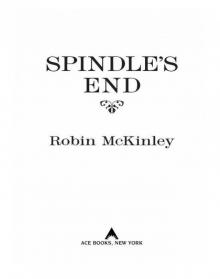 Spindle's End
Spindle's End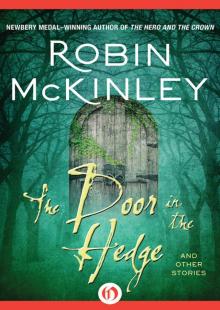 The Door in the Hedge: And Other Stories
The Door in the Hedge: And Other Stories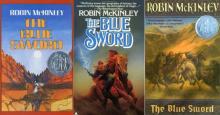 The Blue Sword
The Blue Sword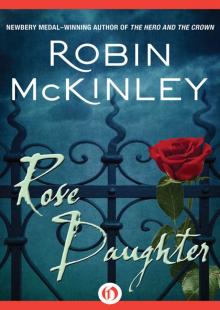 Rose Daughter
Rose Daughter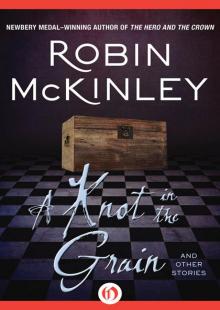 A Knot in the Grain and Other Stories
A Knot in the Grain and Other Stories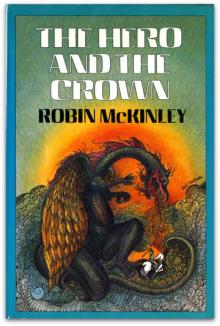 The Hero And The Crown
The Hero And The Crown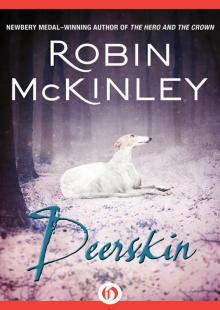 Deerskin
Deerskin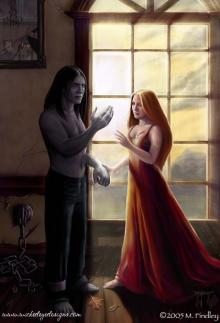 Sunshine
Sunshine Beauty: A Retelling of the Story of Beauty and the Beast
Beauty: A Retelling of the Story of Beauty and the Beast Shadows
Shadows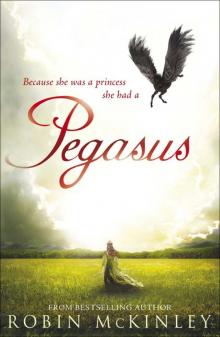 Pegasus
Pegasus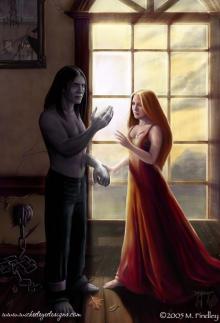 Chalice
Chalice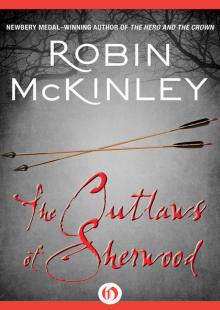 The Outlaws of Sherwood
The Outlaws of Sherwood Fire: Tales of Elemental Spirits
Fire: Tales of Elemental Spirits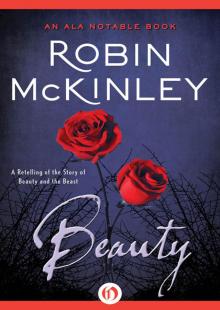 Beauty
Beauty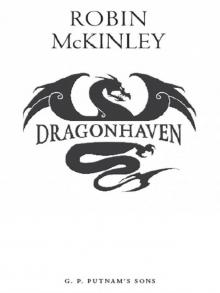 Dragon Haven
Dragon Haven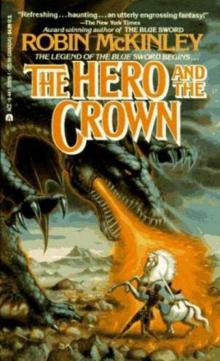 The Hero And The Crown d-2
The Hero And The Crown d-2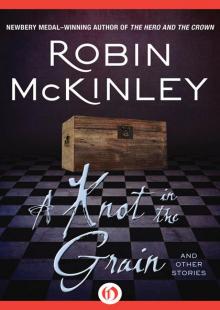 A Knot in the Grain
A Knot in the Grain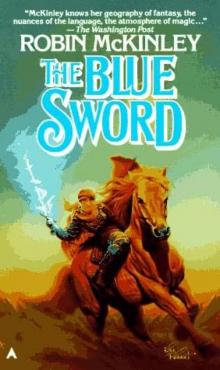 The Blue Sword d-1
The Blue Sword d-1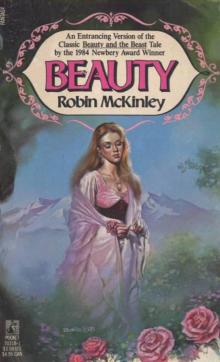 Beauty (v1.2)
Beauty (v1.2)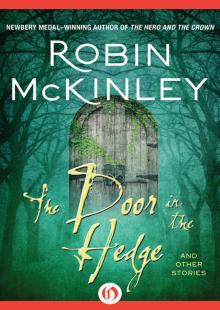 The Door in the Hedge
The Door in the Hedge